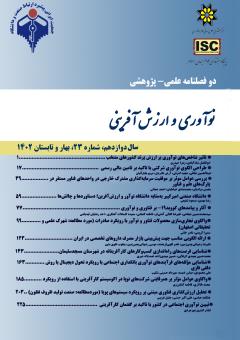واکاوی تجاری سازی محصولات فناور و نوآور با رویکرد صادرات (مورد مطالعه: شهرک علمی و تحقیقاتی اصفهان)
محورهای موضوعی : یافته های جدید علمی در حوزه های نوآوری و کارآفرینی
1 - گروه مدیریت، واحد نجف آباد، دانشگاه آزاد اسلامی، نجف آباد، ایران
2 - گروه مدیریت، واحد نجف آباد، دانشگاه آزاد اسلامی، نجف آباد، ایران
کلید واژه: استراتژی تجاریسازی, شرکت¬های دانشبنیان, صادرات محصولات نوآور و فناور,
چکیده مقاله :
هدف از پژوهش حاضر واکاوی تجاریسازی محصولات فناور و نوآور با رویکرد صادرات (مورد مطالعه: شهرک علمی و تحقیقاتی اصفهان) بود. روش مطالعه کیفی از نوع تحلیل مضمون است. جامعه آماری شامل کارکنان مدیریت بازاریابی و کارکنانی که دارای سابقه و دانش و درک مسائل مربوط به تجاریسازی محصولات نوآورانه تکنولوژی هستند و در شرکت دانشبنیان شهر اصفهان مشغول به فعالیت میباشند بود. با استفاده از روش نمونهگیری هدفمند، دادههای به دست آمده از مصاحبههای نیمه ساختاری با 8 نفر به اشباع نظری رسید. جهت کسب روایی و پایایی یافتههای به دست آمده از روش سه سوسازی استفاده شد. از مفاهیم استخراج شده 9 مفهوم محوری (عامل تفکر، عامل مشورت، نیازسنجی، عامل بازاریابی، عامل صادراتی کردن محصول، ارتقاء کیفیت، عامل تولید، عامل اداری) در 3 بخش کلان (عامل انسانی، عامل بازار هدف، عامل فناوری) شناسائی شد. در همچنین، در خصوص عوامل بازدارنده، موانع زمینهای (موانع مالی اقتصادی، موانع سازمانی، موانع حمایتی، موانع محیطی، موانع انسانی) و موانع ساختاری (موانع ایده پردازی، موانع اجرایی و موانع فرهنگی) تعیین شد. راهکارها شامل راهکارهای نیازسنجی، راهکارهای تبلیغاتی، راهکارهای مالی، راهکارهای توسعه ای، راهکارهای مهارتی نیز شناسئی شد. بررسی همه جانبه عوامل، موانع و راهکارهای ارائه شده در این تحقیق میتواند بر موفقيت تجاریسازی محصولات شرکتهای دانشبنیان تأثیرگذار باشد.
The purpose of the current research was to analyze the commercialization of technological and innovative products with an export approach (case study: Isfahan Scientific and Research Town). The qualitative study method was thematic analysis. The statistical population included marketing management employees and employees who have experience and knowledge and understanding of the issues related to the commercialization of innovative technology products and are working in the knowledge-based company of Isfahan city. Using the purposeful sampling method, the data obtained from semi-structured interviews with 8 people reached theoretical saturation. In order to obtain the validity and reliability of the obtained findings, the triangulation method was used. From the extracted concepts, 9 core concepts (thinking factor, consultation factor, needs assessment, marketing factor, product export factor, quality improvement, production factor, administrative factor) were identified in 3 major sections (human factor, target market factor, technology factor) . Also, regarding the inhibiting factors, background barriers (economic financial barriers, organizational barriers, support barriers, environmental barriers, and human barriers) and structural barriers (ideational barriers, executive barriers and cultural barriers) were determined. Solutions including needs assessment solutions, advertising solutions, financial solutions, development solutions, skill solutions were also identified. A comprehensive review of the factors, obstacles and solutions presented in this research can have an impact on the success of the commercialization of the products of knowledge-based companies
